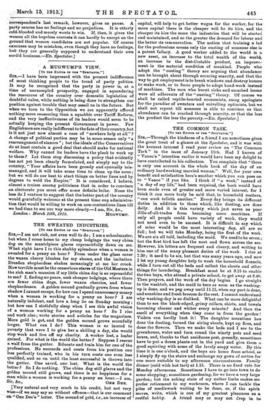THE SWEATED INDUSTRIES.
[TO THE EDITOR OF THE "SPECTATOR.•.] SIR, —I am not rich, not even well to do ; I am a schoolmaster, but when I come home to my cheap lodgings the very china dog on the mantelpiece glares reproachfully down on me. What right have I to this shabby splendour when a woman is sweated for a penny an hour ? From under the glass cover the waxen cherry blushes for my shame, and the imitation Dresden shepherdess shakes menacingly at me her crook. How terrible must be the censorious stares of the Old Masters in the rich man's mansion if my little china dog is so reproachful to me? I, finding no peace, seek cheaper lodgings, where there are fewer china dogs, fewer waxen cherries, and fewer shepherdesses. A golden mound gradually grows from whose shadow I cannot escape, for how can I spend unnecessary money when a woman is working for a penny an hour ? I am naturally indolent, and love a long lie on Sunday morning ; but how can I slothfully sleep when I see this awful vision of a woman working for a penny an hour ? So I rise and work also ; write stories and articles for the magazines. More gold is got, and the golden mound grows scornfully larger. What can I do ? This woman is so inured to poverty that were I to give her a shilling a day, she would stop work and live off my charity. A worker lost, a loafer gained. For what is the world the better? Suppose I rescue a waif from the gutter. Educate and train him for one of the professions. He succeeds and ousts from his position one less perfectly trained, who in his turn ousts one even less qualified, and so on until the least successful is thrown into the gutter. One saved, one lost. What is the world the better? So I do nothing. The china dog still glares and the golden mound still grows, and there is no happiness for a man while a woman is working for a penny an hour.—I am, Sir, &c., ONE DEE. [Very natural and very much to his credit, but not very -sise—if we may say so without offence—that is our comment on "One Dee's " letter. The mound of gold, i.e., an increase of capital, will help to get better wages for the worker, for the more capital there is the cheaper will be its him, and the cheaper its hire the more the industries that will be started and maintained, and so the greater the demand for labour and the better its remuneration. The notion that training a lad for the professions means only the ousting of someone else is a patent fallacy. A good worker added to the world is a new asset, an increase to the total wealth of the world-, an increase to the distributable product, an improve- ment in the material condition of mankind. People who adopt the " ousting " theory are arguing that abundance can be brought about through securing scarcity, and that the way to get employment is to break windows and destroy houses to make work, or to fence people to adopt band-work instead of machines. The men who burnt ricks and smashed looms were all adherents of the " ousting " theory. Of course we shall be called reptile-hearted economists, smug apologists for the paradise of sweaters and snivelling optimists, but we shall not repent till someone is able to convince us that abundance can be reached through scarcity, or that the less the product the less the poverty.—En. Spectator.]














































 Previous page
Previous page